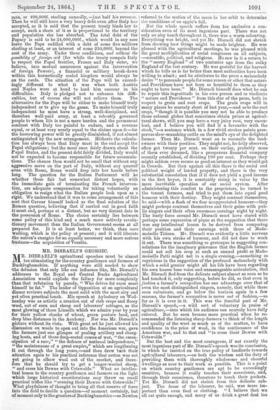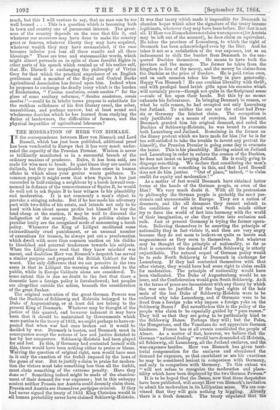MR. DISRAELI'S GEORGIC.
MR. DISRAELI'S agricultural speeches must be almost too stimulating for the country gentlemen and farmers of Buckinghamshire. If anything were still needed to show the delusion that only like can influence like, Mr. Disraeli's addresses to the Royal and Central Bucks Agricultural Association would explode the fallacy far more completely than that refutation by parody, "Who drives fat oxen must himself be fat." The leader of Opposition at an agricultural dinner reviews subjects the most solid with the most airy and yet often practical touch. His speech at Aylesbury on Wed- nesday was as artistic a creation out of rich crops and fleecy wool, out of corn and sheep and labourers' cottages, as the most glowing of those Linnells which we admire year by year for their yellow shocks of wheat, green pasture land, and deep blue distances in the Academy. Nor was Mr. Disraeli's picture without its vista. With great art he just allowed his -discussion on wools to open out into the American war, gave the farmers just one glimpse of pealing artillery and charg- ing hosts, and of those deep-seated causes of war, " the eman- cipation of a race," " the defence of national independence," "the maintenance of a great empire," which are lengthening it out through the long years,—and then drew back their attention again to his practical inference that cotton was not yet going to elbow wool out of the market, and there- fore that he should try to get a longer-wooled sheep, " and cross his Downs with Cotswolds." What an intellec- tual lesson to the country gentlemen and farmers on the light which large historical considerations may throw on small practical trifles like "crossing their Downs with Cotswolds!" What playfulness of thought to bring all that reserve of force into the field to decide a question—of moment certainly, but of moment only to the graziers of Buckinghamshire—as Newton referred to the motion of the moon in her orbit to determine the conditions of an apple's fall. But the whole speech suffers from too exclusive a con- sideration even of its most ingenious part. There was not only an airy touch throughout it, there was a warm colouring. Everything was bright, and yet Mr. Disraeli did not shrink from showing how things might be made brighter. He was pleased with the agricultural meetings, he was pleased with the great multiplication of social congresses on all subjects, —scientific, political, and religious. He saw in it a return to the "merry England" of two centuries ago from the sulky England of the last century. He was grateful for the harvest which he tells us is far better than most authorities have been willing to admit ; and he attributes to the press a melancholy desire " to persuade people for some reason or other that nature and Providence have not been so bountiful to them as they ought to have been." Mr. Disraeli himself does what he can to repair this ingratitude in his own person and to vindicate " nature and Providence " from this slur of the press, both in respect to grain and root crops. The grain crops will is many places be scarcely short of last year,—and as to the root crops, " though it is possible you may not be able to produce those colossal globes that sometimes obtain prizes at agricul- tural shows, still you may have a very juicy root, very succu- lent, and I believe you will find it a favourite with the stock,"—a sentence which in a few vivid strokes paints pros- perous slow-munching cattle on the mind's eye of the delighted farmer. Then Mr. Disraeli went on to reconcile the land- owners with their position. They might not, he drily observed, often get twenty per cent. on their outlay, probably none of them ever dreamed, like a prosperous financial company recently established, of dividing 190 per cent. Perhaps they might seldom even secure as good an interest as they would get in Consols. But then against all this there is the social and political weight of landed property, and there is the very substantial consolation that if it does not yield a good income to the first buyer, it is constantly rising in value by the mere inevitable operation of our social system. After administering this comfort to the proprietors, ho turned to the tenant farmers, and tried to put them into equal good humour with their destiny. They might contrast themselves, he said—with a flash of we fear unappreciated humour—they might perhaps contrast themselves and their gains with pub- lic singers and their often enormous earnings night by night. The burly faces around Mr. Disraeli must have stared with perhaps some expression of pique at the suggestion that there was any intellectual lesson to be derived from comparing their position and their earnings with those of Made- moiselle Titiens. Mr. Disraeli was evidently a little nervous with his own stroke of humour, and did not dare to work it out. There was something so grotesque in suggesting con- solations for the imaginary grievance that the English farmer could not sell his crop at such an annual profit as Made- moiselle Patti might net in a single evening,—something so capricious in the suggestion of the profound melancholy with which a solid grazier might all his life have been regarding his own hoarse bass voice and unmanageable articulation, that Mr. Disraeli fled from the delicate subject almost as soon as he had touched it, only suggesting, before he did, so that even in fashion a farmer's occupation has one advantage over that of even the most distinguished singers, namely, that while these soon culminate, and go below the horizon again in a few seasons, the farmer's occupation is never out of fashion,—so far as it is ever in it. This was the fanciful part of Mr. Disraeli's speech,—a wild sort of voluntary in praise of agriculture,—into which his audience can scarcely have fully entered. But he soon became more practical when he re- commended the listening sheep-farmers to think of the length and quality of the wool as much as of the mutton, to have confidence in the price of wool, in the continuance of the American war, and to that end " to cross their Downs with Cotswolds."
But the best and the most courageous, if not exactly the most ingenious part of Mr. Disraeli's speech was its conclusion, in which he insisted on the true policy of landlords towards agricultural labourers,—on both the wisdom and the duty of providing them with thoroughly wholesome and cheerful dwellings as near to their work as possible. This is a point on which country gentlemen are apt to be exceedingly sensitive, because it really touches their conscience, and, through their conscience, threatens to touch their pockets. Yet Mr. Disraeli did not shrink from this delicate sub- ject. The house of the labourer, he said, was more im- portant than even food or clothing. "I believe that we all eat quite enough, and many of us drink a great deal too much, but this I will venture to say, that no man can be too well housed . . . This is a question which is becoming both in town and country one of paramount interest. The great- ness of the country depends on the race that fills it, and whatever our ancestors may have done to make the country great or famous, whatever liberty they may have acquired, whatever wealth they may have accumulated, if the race becomes inferior you lose all these results and all these blessings." These are true and statesmanlike words, which might almost persuade us in spite of those fanciful flights in other parts of his speech which remind as of his earlier self, that Mr. Disraeli is exchanging the philosophy of Vivian Grey for that which the practical experience of an English gentleman and a member of the Royal and Central Bucks Agricultural Association has forced upon him. Indeed when he proposes to exchange the deadly irony which is the burden of Ecclesiastes, " Vanitas. vanitatum, omnia vanitas I" for the gloss of some sanitary reformer, " Sanitas sanitatum, omnia sanitas f'—could he in briefer terms propose to substitute for the reckless selfishness of his first literary creed, the sober, unambitious, and perhaps narrow, but at least sound and wholesome doctrine which he has learned from studying the duties of landowners, the difficulties of farmers, and the physical impurities of agricultural labourers ?































 Previous page
Previous page